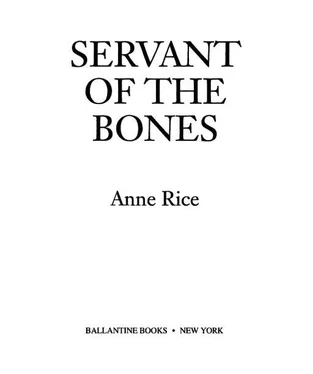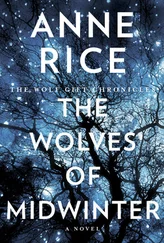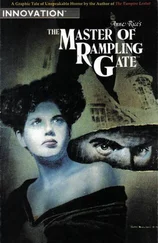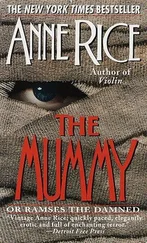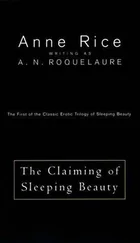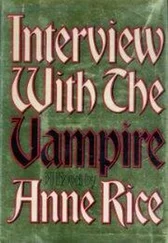Then, lifting his hand, he began to tremble. But it wasn’t cowardice. It wasn’t even shock. It was glee, the pure mad glee he’d felt when he looked at the skull.
He wanted to touch me. He rubbed his hands together, and he reached out and then he drew back.
“Go ahead,” I said. “I don’t care. Do it. I would like you to do it.”
I reached forward and grabbed his right hand before he could stop me and I lifted it as he stared amazed. His mouth opened. I lifted his hand and pushed it against my thick hair, and laid it on my cheek, and then against my chest.
“You feel a heartbeat?” I asked. “There is none. Only a living pulse as if I were whole and entire a heart, made of a heart, when the very opposite is surely the truth. I feel your pulse, true enough, and it races. I feel your strength and you have much.”
He tried to free his hand, but only politely, and I wouldn’t let him do it; I held his hand now so that I could see the palm of it in the flashing light coming through the windows.
The car went very slowly.
I saw the lines in his palm, and then I opened my right hand which was free, and I saw the lines in my palm too. I had done well. No Master had ever done better. But I didn’t know how to read these lines, only that they had come to me in glorious detail.
Then I made a decision to do something which I could not explain to myself. I kissed the palm of his hand. I kissed this tender flesh of his hand; I pressed my lips right against it and when I felt the shiver pass through him, I gloried in it, almost the way he was glorying in my presence.
I looked into his eyes and saw something of my own eyes in them, in their largeness, their darkness, even in the thick fringe of lashes of which I, once alive, had been so very proud.
I wanted to kiss his lips, to lock hold of them, and to kiss as enemies kiss before one tries to kill the other.
Indeed, if there had ever been a moment for the Servant of the Bones like this with any mortal, I didn’t remember it. Not a wisp of such a memory remained; indeed, I felt nothing now except a fascination with him, and all that came to trouble it was her face, Esther’s, and her lips and her dying words.
“And what makes you think that I am not Master!” he whispered. A shining smile spread on his lips, almost rapturous.
I released his hand and he slipped it away, and brought his own two hands together as if to protect them against me, but this was done with graceful composure.
“I’m the Master and you know it,” he said it gently. But his voice was eager and loving. “Azriel! You’re mine.”
There wasn’t even a sensible particle of fear in him. Indeed the wonder he knew now seemed the kernel of his person, the part of him which had always defied the Rebbe and had defied a legion of others, and would defy me. The wonder in him was…what? The monstrous arrogance of an Emperor?
“I am not the Master?” he asked me.
I looked at him calmly. I was thinking about him in wholly new ways, not ways of rage, but ways of wanting to know: who and what was he? Had he killed her? What if he had not?
“I say not, Gregory,” I answered his question. “You’re not the Master. But then I don’t know everything. Ghosts must be forgiven that they know so much and so little at the same time.”
“Rather like mortal men,” he said with a delicate touch of sadness. “And were you ever one of them?”
A chill caught me off guard, rippling over new skin. Dimness. The cries of people echoing up glazed brick walls. I shook myself all over.
Certainly I had once been a mortal man! And so what.
I was here now in the car with him. The process of incarnation continued in me, with the thickening of the sinews and the deepening of the minerals within the new bones which were now in my fleshly body, and the hair that formed on the backs of my arms and on my fingers, and the soft remnant of beard on my cheek.
And this process had to be of my doing. He sang no songs to make it happen; he recited no chants. He didn’t even know it was happening. If there was an alchemy coming from him, it was the alchemy of his expression, his wonder, his obvious love.
Again came the dimness. It came swift and titanic—a procession, a great street with high blue-glazed walls, and the scent of flowers everywhere, and people waving, and a dreadful sadness, so bitter, so total, that for one moment I felt myself begin to dissolve.
The car around me seemed insubstantial, which meant that I was leaving it.
In the memory I raised my arm and voices cried in praise.
My god wouldn’t look at me. My god turned his back on me and on the procession, and he wept.
I shook my head. Gregory Belkin was watching all this, keenly sensing it.
“Something troubles you, Spirit,” he said gently. “Or is it merely so hard to become flesh again?”
I took hold of the door handle. I looked at the glass and at my face.
I was the one who made myself stay.
The car shuddered and rumbled as it moved over the roughened street. He took no notice. But new light had come in from both sides, penetrating even the black glaze of the windows, and it showed how jubilant he was, and how easy, and how young he looked in his wonder and joy.
“Very well,” he said with charm, eyebrows lifted, “so I am not the Master. Then tell me, beautiful one, and you are quite the handsome Spirit, why have you come to me?”
Once again, his teeth flashed white and there seemed a moment near magical when the various ornaments he wore—small and made of gold, at his wrists, on his tie—flickered as if struck by a note of music, and he looked very good, as good perhaps as he thought I looked.
Masters.…Who were masters to me? Old men?
I spoke before I thought.
“There was never a Master as brave as you, Gregory,” I said, “not that I can remember, though so much lies beyond my reach. No, your bravery is different, and fresh. And you are not the Master. It seems, like it or not, that I have come to you on my own and for my reasons.”
This pleased him immensely.
I grew warmer and I felt the fibers of my clothes against me, I felt the snug certainty of being there. My foot flexed in my shoe.
“I like that you’re not afraid of me,” I said. “I like that you know what I am from the start as any Master might, but you’re not the Master. I’ve been watching you. I’ve been learning things from you.”
“Have you?” he said. He did not so much as flinch. He was in near ecstasy. “Tell me what you’ve seen.” At the moment it seemed there was only one thing he found more fascinating than me, and that was himself.
I smiled at him.
He wasn’t a man unused to happiness. He knew well how to enjoy things, both minute and momentous. And though nothing like this had ever happened to him, his life had educated him to enjoy this too.
“Yes,” he said, smiling broadly. “Yes!”
I hadn’t spoken. We both knew it. Yet he had read my thoughts? What else is in there to read, I wonder?
The big car slid to a stop.
I was glad. I was frightened by his charm, frightened by the fact that I warmed to him, frightened that somehow in talking to him I gained strength. He didn’t have to want it or wish it, only perhaps to witness it. But this I couldn’t tolerate. I had been there when Esther died and he had not. He had not been there to see me, yet I had been strong enough to take the lives of her killers each in turn.
He stared out the windows, to the right and left. An immense crowd surrounded us, roaring, shouting, pushing up against the car so that it rocked suddenly on its wheels as a boat in water.
He was not concerned. He turned and looked at me. I felt that dimness come again, because this crowd reminded me of that old crowd, the crowd attending the procession, and the petals falling in the light, the incense rising, and people on the flat rooftops, standing at the very edge, with their arms outstretched.
Читать дальше
